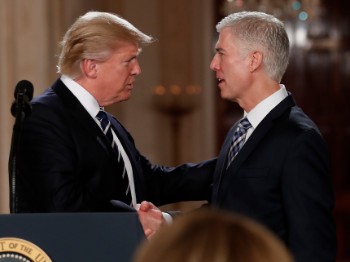
President Donald Trump shakes hands with 10th U.S. Circuit Court of Appeals Judge Neil Gorsuch, his choice for Supreme Court Justices in the East Room of the White House in Washington, Tuesday, Jan. 31, 2017. (AP Photo/Carolyn Kaster)
WASHINGTON — Religious liberty and pro-life advocates warmly welcomed President Trump’s nomination of Neil Gorsuch to the U.S. Supreme Court as the Senate prepares for what is expected to be a hard-fought confirmation battle.
Trump announced his selection of Gorsuch, 49, a federal appeals court judge, Jan. 31 to fill the seat created by the death of Associate Justice Antonin Scalia last February.
In Gorsuch, Trump nominated a judge who — like Scalia — has a philosophy and record of interpreting the Constitution and laws based on its original meaning and their text, respectively.
A judge for the last 10 years on the 10th Circuit Court of Appeals in Denver, Gorsuch agreed with others on the court that the Obama administration’s abortion/contraception mandate violated the free exercise of religion rights of Hobby Lobby and Little Sisters of the Poor among other religious groups.
Although he apparently has not ruled on abortion rights, Gorsuch wrote a 2006 book “The Future of Assisted Suicide and Euthanasia” before becoming a judge, arguing against legalization of the end-of-life practices. Based on his judicial philosophy, however, Gorsuch has pledged to apply the law rather than his beliefs.
Southern Baptist ethicist Russell Moore called Gorsuch “an exceptional choice.”
“I heartily support President Trump’s excellent appointment,” said Moore, president of the Ethics & Religious Liberty Commission. “(Gorsuch) is a brilliant and articulate defender of Constitutional originalism in the mold of the man he will replace: Justice Antonin Scalia. His career is one that exemplifies the very best of intellectually robust conservatism, judicial restraint and faithfulness to the Constitution.
“I look forward to Judge Gorsuch’s voice on the Court for decades to come and pray that he will be an articulate and stalwart advocate for religious liberty and human dignity at all its stages,” Moore said. “Along with Baptists and other believers around the country, I urge the Senate to confirm Judge Gorsuch without delay.”
Gorsuch’s confirmation to the high court seemingly will be a battle, based on the response of Senate Democratic leadership to his nomination.
Sen. Charles Schumer, the Senate minority leader, said he has “very serious doubts about Judge Gorsuch’s ability” to be independent and non-ideological, “preserve our democracy, protect fundamental rights” and stand up to Trump.
According to The Hill, the New York senator said Democrats will “require an exhaustive, robust, and comprehensive debate on Judge Gorsuch’s fitness” for the court.
Sen. Ben Sasse, R.-Neb., cited the Senate’s confirmation of Gorsuch to the 10th Circuit without opposition and defended his record as distinguished and “rooted in respect for the law.”
In announcing Gorsuch’s nomination from the White House, Trump said the judge’s qualifications “are beyond dispute” and urged Republican and Democratic senators to come together for the country’s good.
Republicans have only a 52-48 majority in the Senate, with 60 votes needed to stop a Democrat filibuster or another parliamentary maneuver for Gorsuch’s nomination to move forward.
The division over Gorsuch was obvious in comments from both sides of the legal and cultural divide.
Jay Sekulow, chief counsel of the American Center for Law and Justice, described Gorsuch as “a remarkably qualified nominee with a conservative judicial philosophy and a commitment to uphold the rule of law and the Constitution. He is decidedly pro-life and understands what it means to protect the constitutional freedoms afforded to all Americans.”
Carol Tobias, president of the National Right to Life Committee, said, “All too often, our efforts to protect unborn children and other vulnerable humans have been overridden by judges who believe they have a right to impose their own policy preferences. We are heartened that Judge Gorsuch appears to share Justice Scalia’s view that federal judges are constrained to enforce the text and original intent of constitutional provisions, and on all other matters should defer to democratically elected lawmakers.”
Liberal organizations, however, called for the Senate to reject Gorsuch.
Ilyse Hogue, the president of NARAL Pro-choice America, called the nominee “a direct threat to Roe v. Wade (the 1973 decision that legalized abortion) and the promise it holds for women’s equality.”
Chad Griffin, president of the Human Rights Campaign, the country’s largest political organization for lesbian, gay, bisexual and transgender rights, said Gorsuch has an “anti-equality record” that makes him “unfit to sit on the nation’s highest court. We cannot afford a justice who will roll back our rights, or who will be a rubber stamp for Donald Trump’s unconstitutional actions.”
Gorsuch, in his remarks after Trump introduced him, said putting on robes doesn’t make judges “any smarter,” but it does provide a reminder of what is expected of them: “Impartiality and independence, collegiality and courage.”
The role of judges is “to apply, not alter the work of the people’s representatives,” Gorsuch said. “A judge who likes every outcome he reaches is very likely a bad judge, stretching for results he prefers rather than those the law demands.”
If confirmed, Gorsuch — who is Episcopalian — would be the only Protestant on the court. The other eight justices are either Jewish or Roman Catholic. (BP)
Tom Strode